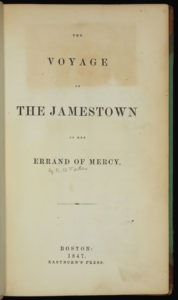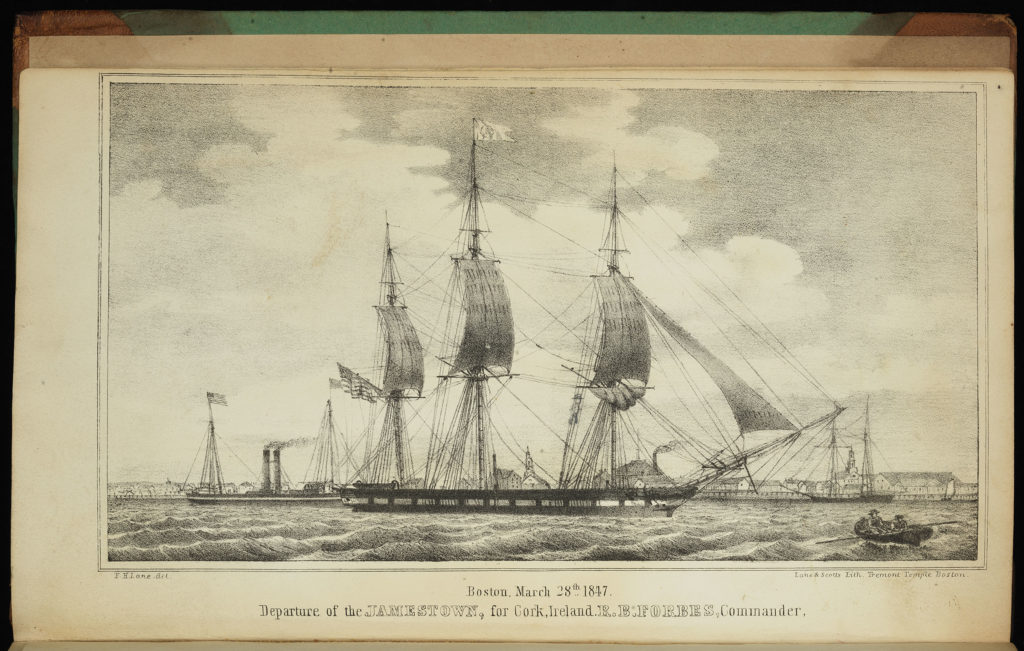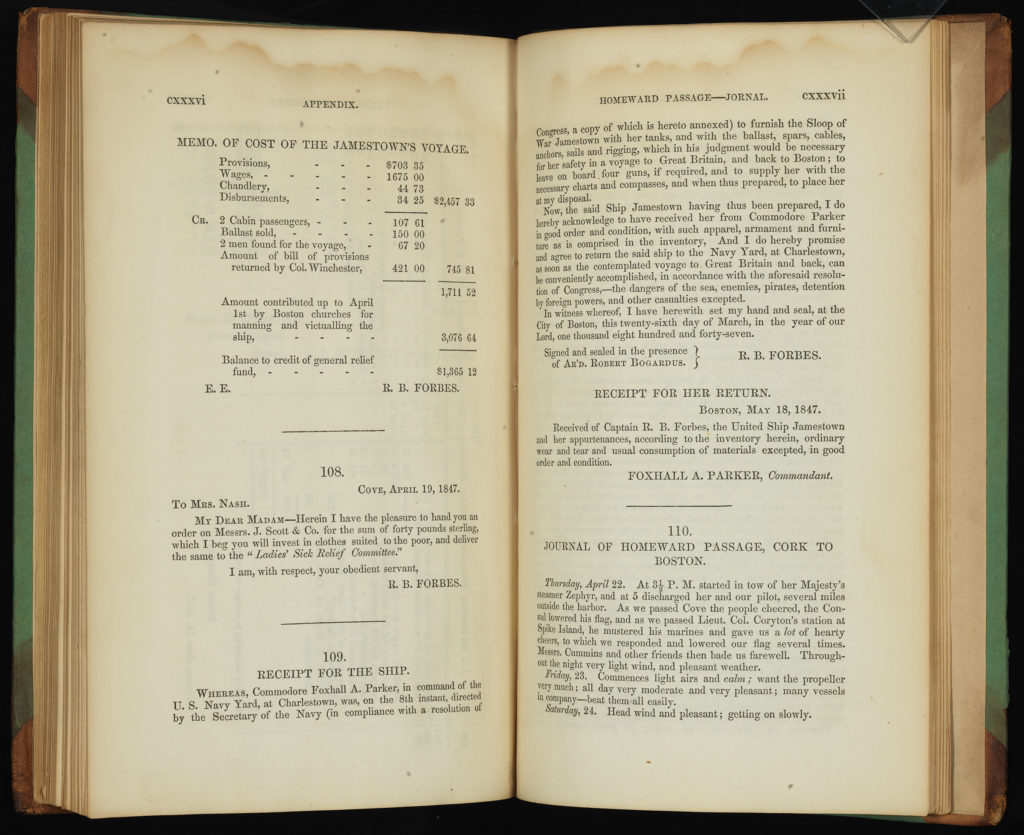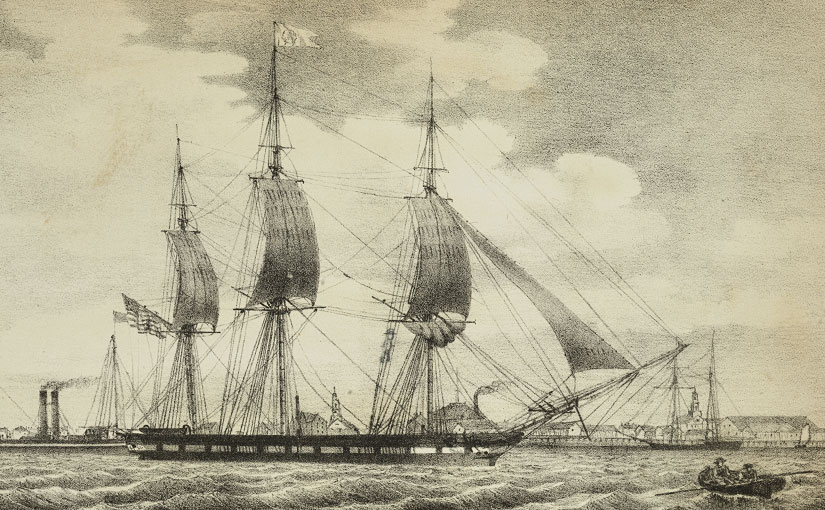by Aedín Ní Bhróithe Clements, Irish Studies Librarian
 … on Sunday, the 29th March, at 8½ A.M., we cast off from the Yard, with a fine breeze at the N. W., and clear cold weather, the steam Tug, “R. B. Forbes,” in company, with some of the members of the Committee, on board. In about one hour we parted from them, with hearty cheers, and made sail on our course.
… on Sunday, the 29th March, at 8½ A.M., we cast off from the Yard, with a fine breeze at the N. W., and clear cold weather, the steam Tug, “R. B. Forbes,” in company, with some of the members of the Committee, on board. In about one hour we parted from them, with hearty cheers, and made sail on our course.
A remarkable voyage to bring relief to the Irish in the Great Famine is the subject of Captain R. B. Forbes’ report, The Voyage of the Jamestown on Her Errand of Mercy, published in Boston in 1847. His report for the “Committee of Distribution” combines his account with a substantial appendix of correspondence and other documentation.

After the Irish potato crop failed due to blight in 1845 and again in 1846, knowing that the potato provided most of the subsistence for a large part of the Irish population, concern for this famine grew throughout the world, but especially in places such as Boston where there was a considerable population of Irish birth or descent. Those who provided assistance in early 1847 expected that the harvest later that year would bring an end to famine, but in fact the blight persisted and the Great Irish Famine lasted until 1852. [i]
In these early decades of the United States’ existence, official U.S. government aid to other countries was a new idea, and so the introductory remarks in Captain Forbes’ account justify the assistance by mentioning aid given by Ireland to the pilgrims in New England back in 1676.
Captain Forbes describes the decision to provide two U.S. navy ships as follows:
You are aware that certain Boston merchants, on the twenty-second day of February, the birth-day of the “Father of our Country,” forwarded a petition to the Honorable Robert C. Winthrop, asking Congress to lend one of their ships of war, for the purpose of carrying to Ireland a cargo of provisions; on the third day of March, the last stormy day of the session, when the attention of every mind in Congress was taken up with the discussion of financial and warlike measures, the people of the United States, be it said to their honor, voted the loan of the Frigate Macedonian, to Captain George C. DeKay, of New Jersey, and the loan of the “Sloop of War” Jamestown, to myself, and by a joint resolution of both Houses, the President and Secretary of the Navy, were authorized to send these vessels at the expense of the United States, or to put them into our hands, for the benevolent purpose indicated. [ii]
Accounts of the Jamestown Voyage remark on the efficiency of the loading of the ship and also of the speed with which the Jamestown travelled from Boston to Cork. Historical accounts of this and of the other ship, the Macedonian, describe much difficulty and delay in getting the Macedonian prepared for voyage from New York. [iii] In the light of this comparison, the description of the Jamestown’s preparation and setting off must have been a source of great pride for the people of Boston.
… on the 17th, being St. Patrick’s day, the “Laborers Aid Society,” of Boston, composed principally, if not entirely, of poor Irishmen, put their hands and minds to the holy work, and in the course of that day, one-seventh part of the cargo was stowed away; and by the 27th, after an interruption by bad weather, the ship was full, drawing nearly twenty feet, and having, with her stores, about 8,000 barrels bulk, of provisions, grain, meal, &c., on board. [iv]
Captain Forbes in Cork
On anchoring near Cove, or modern-day Cobh, the harbor by Cork City on the southern coast of Ireland, the ship had many visitors before being towed to the docks two days later. Captain Forbes’ description hints at a festive atmosphere with members of the Temperance Institute to the forefront of activities.
I should have stated that the cove Temperance Band had been on board all day, discoursing sweet music. Among the tunes performed, Yankee Doodle and Lucy Long being prominent, and from the frequency of the former, I conclude the Irish consider it our only national anthem!
On Tuesday we had plenty of men from the Crocodile to assist in weighing our anchors, &c., and at night the town of Cove was illuminated, and as we passed up the harbor in tow of the Sabrina, the good people cheered, and the ladies waved their muslin in welcome of our arrival. [v]
In Cork Captain Forbes and the crew were invited to banquets and meetings, and Forbes was also taken by Father Theobald Mathew, the famous temperance crusader, on a tour of the streets of Cork where he witnessed the effects of the Famine:
I went with Father Mathew, only a few steps out of one of the principle streets of Cork, into a lane; the vallye of the shadow of death was it? Alas, no, it was the valley of death and pestilence itself! I saw enough in five minutes, to horrify me—hovels crowded with the sick and dying, without floors, without furniture, and with patches of dirty straw covered with still dirtier shreds and patches of humanity; some called for water to Father Mathew, and others for a dying blessing. From this very small sample of the prevailing destitution we proceeded to a public soup kitchen, under a shed, guarded by police officers, here a large boiler containing rice, meal, &c., was at work, while hundreds of spectres stood without begging for some of this soup, which I can readily conceive would be refused by well bred pigs in this country. [vi]
What did they deliver?
What were the supplies brought by Captain Forbes and the USS Jamestown? Forbes provides the report of the Cork Advertiser of April 15th, 1847 :
From the Boston Committee:
400 barrels Pork
100 tierces Hams
655 barrels Corn Meal
4,688 bags Indian Meal
1.496 bags Northern Corn
1,375 barrels Bread
553 barrels Beans
84 barrels Peas
From sundry towns, individuals and societies
533 barrels Corn
18 barrels Corn Meal
11 barrels Oat Mea
84 barrels Potatos
1 bag Potatos
547 bags Corn
1 barrel Flour
23 barrels Rye
11 packages Rye
1 barrel and 1 box Oats
3 bags Wheat
1 tierce Dried Apples
3 tierces and 1 bag Beans
6 boxes Fish
201 bags Meal
1 half barrel Meal
29 barrels and boxes Clothing
From the Charlestown Committee
50 barrels Flour
1 half barrel Flour
100 barrels Rice
50 barrels Corn Meal
2 barrels Bread
60 barrels Beans
1 half barrel Beans
5 barrels Beans
4 boxes Clothing
800 empty Bags (we presume for discharging the corn) [vii]

Poems and Ballads
The report also includes ballads and verses composed to celebrate the Jamestown voyage. The poems make much of the fact that a battleship is transformed for a different purpose, as in this excerpt from “The War-Ship of Peace” by Samuel Lover:
Look out, look out across the sea
That girds thy Emerald shore,
A ship of war is bound for thee,
But with no warlike store;
Her thunder sleeps—‘tis Mercy’s breath
That wafts her o’er the sea;
She goes not forth to deal out death,
But bears new life to thee. [viii]
While the Jamestown and Macedonian voyages were official insofar as the ships were naval vessels, authorized by the U.S. Congress for this use, over the period of the Great Famine, many private ships were used to carry food across the Atlantic from America. Christine Kinealy’s Charity and the Great Hunger in Ireland: The Kindness of Strangers (2013) tells the stories of many relief efforts.
Who was Captain Forbes?
Robert Bennet Forbes (1804-1889), captain of the ship and author of the report, was highly-regarded seaman and businessman. Born in Massachusetts, he received a good education and, working with his uncles who were China Trade merchants, he was a ship’s captain by the time he was twenty-one.
At the time of the Jamestown voyage, Forbes had spent much of his career in a successful shipping business with China, and had turned his attention to shipbuilding, and later built ships for the Union cause during the Civil War.
In the following years, Forbes was involved in a number of philanthropic projects. His papers are held at the Massachusetts Historical Society, whose collection guide provides an interesting summary of his biography. The Forbes House Museum in Milton, Massachusetts, is a museum of the Forbes family.
Notes:
[i] Morash, Christopher. Writing the Irish Famine (1995), pp. 2-3. Online: Oxford Scholarship Online, accessed July 3, 2017. DOI: 10.1093/acprof:oso/9780198182795.001.0001
[ii] Forbes, R. B. The Voyage of the Jamestown on her Errand of Mercy. Boston, 1947, p. 7.
[iii] Sarbaugh, Timothy J. ‘”Charity Begins at Home”: The United States Government & Irish Famine Relief 1845-1849’, in History Ireland, 4:2 (Summer, 1996), pp. 31-35. Accessed July 4, 2017. http://www.jstor.org/stable/27724343
[iv] Forbes, p. 8.
[v] Forbes, p. 10.
[vi] Forbes, p. 22.
[vii] Forbes, p. xlii
[viii] Forbes, p. clii
 This work is licensed under a Creative Commons Attribution 4.0 International License.
This work is licensed under a Creative Commons Attribution 4.0 International License.
